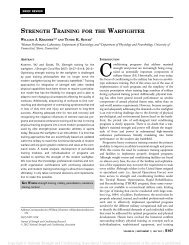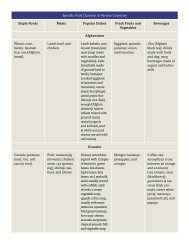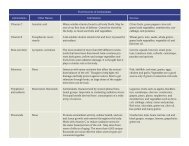Traumatic Brain Injury and Effects of Altitude - Human Performance ...
Traumatic Brain Injury and Effects of Altitude - Human Performance ...
Traumatic Brain Injury and Effects of Altitude - Human Performance ...
You also want an ePaper? Increase the reach of your titles
YUMPU automatically turns print PDFs into web optimized ePapers that Google loves.
<strong>Traumatic</strong> <strong>Brain</strong> <strong>Injury</strong> (TBI) <strong>and</strong> <strong>Effects</strong> <strong>of</strong> <strong>Altitude</strong>:An Analysis <strong>of</strong> the Literaturefluid loss after injury. Whether hypotonic (due to loss <strong>of</strong> electrolytes), hypertonic (due to loss <strong>of</strong> water)or isotonic (due to loss <strong>of</strong> water <strong>and</strong> electrolytes), dehydration can interfere with central nervous systemfunction.Fluid management is thus an important <strong>and</strong> challenging aspect <strong>of</strong> TBI patient care. Although fluidrestriction has traditionally prevailed as the clinical protocol for preventing edema after brain injury(Shenkin et al., 1976), this practice is not supported by experimental findings (Gaab et al., 1979; Morseet al., 1985). Today, effective fluid balance management is widely accepted as a cornerstone formaintaining adequate blood pressure; in turn, optimal fluid management may help to reduce secondarybrain injury by reducing ICP <strong>and</strong> improving cerebral blood flow (Badjatia et al., 2008; Shackford et al.,1992).Fluid resuscitation <strong>and</strong> management may also be important to correct for electrolyte derangements thatcan compromise TBI patient status <strong>and</strong> outcome. 11 For example, TBI-related injury <strong>and</strong>/or secondaryeffects are <strong>of</strong>ten associated with blood sodium imbalance. Hyponatremia (low blood sodium, < 135mEq/L) is common after TBI, causing water retention by an increased volume <strong>of</strong> extracellular fluid. Thismay indicate TBI-related pituitary dysfunction <strong>and</strong> related anti-diuretic hormone (ADH/vasopressin)abnormality. If not treated, hyponatremia can cause confusion, convulsions, stupor, or even coma.However, it is likewise important to prevent blood sodium excess. Hypernatremia (elevated bloodsodium, > 145 mEq/L) can also occur after TBI <strong>and</strong> is equally important to monitor <strong>and</strong> treat. Earlysymptoms <strong>of</strong> hypernatremia are <strong>of</strong>ten subtle, including lethargy, weakness, <strong>and</strong> irritability. In severeform, hypernatremia can also cause seizures <strong>and</strong> coma.We identified just two studies that specifically addressed the effects <strong>of</strong> fluid volume on TBI outcome(Appendix: Table 6). An analysis <strong>of</strong> data from the National Acute <strong>Brain</strong> <strong>Injury</strong> Study <strong>of</strong> 392 severe TBIpatients found that low fluid balance (< - 594 mL) was an independent predictor <strong>of</strong> poor TBI outcome,<strong>and</strong> was an even more powerful a predictor than ICP (> 25 mmHg) (Clifton et al., 2002). Although theexact basis for this relationship was not clear, the authors’ analyses indicated that the low fluid balanceeffect was not related to ICP, MAP or CPP. The study emphasized the need for careful attention to TBIpatient fluid balance, noting that some <strong>of</strong> the most severely affected patients did not receive adequatefluid replacement.The importance <strong>of</strong> effective fluid management is reinforced by the finding that even a mildderangement <strong>of</strong> electrolyte balance (sodium disorder) can have potentially serious implications forpatients with severe TBI. In the immediate aftermath <strong>of</strong> TBI, mild hypernatremia (Na > 145 mmol/l) wasindependently associated with a higher risk <strong>of</strong> mortality (Maggiore et al., 2009). Hypernatremiaoccurred in more than half <strong>of</strong> the 130 severe TBI patients in this study <strong>and</strong> was due to TBI-relatedcentral diabetes insipidus in a subset <strong>of</strong> them.There are several treatment options available for fluid resuscitation/management. Mannitol (a sugaralcohol solution) is generally safe, effective, <strong>and</strong> has been commonly used to reduce ICP, <strong>and</strong> improveCPP <strong>and</strong> cerebral oxygenation. However, mannitol has several known limitations including the possibilitythat it may cause hypotension in already hypovolemic (dehydrated) patients. An alternative approachinvolves the use <strong>of</strong> hypertonic saline (Schmoker et al., 1991), which has been well-supported by the11 A detailed review <strong>of</strong> underlying mechanisms is beyond the scope <strong>of</strong> this review, <strong>and</strong> can be found elsewhere (Rhoney et al.,2006).September 14, 2010 20





![Body Composition and Military [PDF] - Human Performance ...](https://img.yumpu.com/43269347/1/190x245/body-composition-and-military-pdf-human-performance-.jpg?quality=85)
![Tips for Grocery Shopping [PDF]](https://img.yumpu.com/37447379/1/190x245/tips-for-grocery-shopping-pdf.jpg?quality=85)



![Synthetic Drugs [PDF] - Human Performance Resource Center](https://img.yumpu.com/37447322/1/190x245/synthetic-drugs-pdf-human-performance-resource-center.jpg?quality=85)



